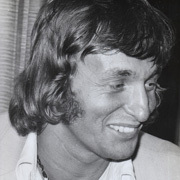
Ray Woolf
Ray Woolf's CV makes mention that he can sing country and western, jazz, musical theatre, pop, rock, and rock n roll. Though CVs are sometimes to be treated with scepticism, this one speaks the truth: Woolf has sung across many genres, both on stage, and over a long run of music and variety shows on television.
Woolf grew up in Dagenham on the edge of London, not far from Europe's largest car factory (which was immortalised in 2010 movie Made in Dagenham). Playing in bands from the age of 13, he went on to a short stint at a London singing school, where he met future singing star Helen Shapiro. The Woolf family immigrated to New Zealand soon after, but the connection proved fortuitous; Woolf got the chance to support Shapiro when she toured down under.
Having signed to a local record label, he spent time in short-lived band the Newsounds, before winning fame in Auckland popsters Ray Woolf and the Avengers. The Avengers released three singles, one of them nominated for a Loxene Golden Disc Award, before Woolf departed to present radio series Pop-a-Long.
Woolf began singing on local television early, with 1962 teen show In the Groove. Music and variety shows proliferated on local TV over the 60s and 70s, and Woolf's versatility saw him featuring in an impressive percentage of shows. In the first decade of Kiwi television he sang in On the Beat Side, presenter Peter Sinclair's first TV show Let's Go, and mimed in an Auckland studio for beloved pop show C'mon (including the opening number of this episode). In the 70s, paralleling the path of his own singing career, Woolf moved on to co-hosting the more middle-of-the-road show Happen Inn, alongside singer Suzanne Lynch.
Initially horrified at being asked to audition for pre-school staple Play School, Woolf later described the experience as a turning point. Having learnt "to be a pop singer on television", his 18 months co-presenting the classic children's show provided valuable experience in scripts, acting and how TV works. The first of many stage musicals followed, providing further acting experience. Play School "taught me never turn your back on anything: you just never know."
Woolf went on to co-host chat show Two on One, initially with singer Val Lamond, then with fellow Brit Davina Whitehouse. In 1979 he got his own singing and talk slot, The Ray Woolf Show. The format saw him interviewing international guests, singing and filming clips around the country. The following April the show was reformated for two seasons as The New Ray Woolf Show, this time with much more emphasis on music.
During this period Woolf won awards for best television light entertainer for four years straight. Alongside Howard Morrison, he also did 12 years worth of TV promos hawking Bic lighters, razors and pens ("it's the lighter you light with").
By now Woolf had begun expanding his performance skills beyond music and musicals. He made his screen acting debut in 1975 with South Pacific Television soap A Going Concern, playing an Englishman working at a South Auckland plastics factory. Despite reviews praising the show's characters and direction, A Going Concern was cancelled after one season, partly thanks to the limited audience then able to receive the new second channel. No episodes survive, apart from this 23 second clip, featuring Woolf. He went on to appear in multiple episodes of big-budget co-production The MacKenzie Affair, playing the constable who arrests real-life sheep-rustler James MacKenzie.
Since then, Woolf has done guest roles on Marlin Bay, The Strip, and Mortimer's Patch (playing a mechanic). He went against type to play a woman-hating strangler on Street Legal, and played parent to one of the teen protagonists of 1997's One of Them!. He was an angel in futuristic short Letters about the Weather, and a dodgy taxi driver caught up in haunting in the 'Ghost of Our Own' episode of anthology series A Twist in the Tale.
Woolf made his movie debut in Peter Jackson's remake of King Kong, spending four months in Wellington playing one of the boat crew. With The Insatiable Moon, he ended up winning another role from the one he'd auditioned for: that of an Elvis Presley fan who gets to sing a showstopping number in a key scene.
In 2011 series Nothing Trivial he played father to Shane Cortese's character. Woolf described the role as "a bit of a philanderer, loves the ladies; 60 going on 70, but thinks he's 35". In true story tele-movie Siege he played a Napier man caught up in a shoot-out.
Long a believer in performing live, Woolf has sung with the Rodger Fox Big Band and Suzanne Lynch, and toured Kiwi theatres in everything from The Sound of Music to The Rocky Horror Picture Show.
In 2007 Woolf was awarded with a Benny, the supreme award given by the NZ Variety Artists Club. A Queen's Service Medal and a Member of the New Zealand Order of Merit followed, both marking his services to entertainment.
Profile updated on 8 June 2022
Sources include
Ray Woolf
Robert Boyd-Bell, New Zealand Television - The First 25 Years (Auckland: Reed Methuen Publishers, 1985)
Alice Cowdrey, 'Woolf still at the door' (Interview) - The Nelson Mail, 24 September 2009
John Dix, Stranded in Paradise (Auckland: Penguin Books, 2005)
Trisha Dunleavy, Ourselves in Primetime - A History of New Zealand Television Drama (Auckland University Press, 2005)
John Haines, 'Ray Woolf: A Lifetime in the Music Business' (Audio Interview) Loaded 29 November 2008. Accessed 5 September 2016
'Ray Woolf and the Avengers' (Profile). Sergent website. Accessed 8 June 2022